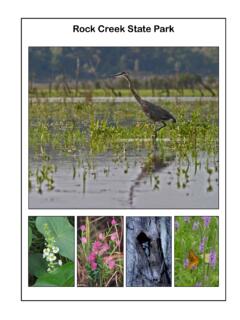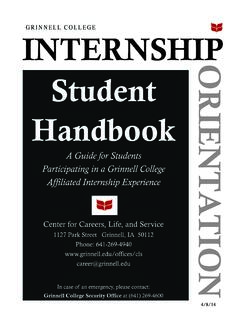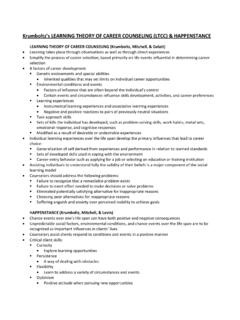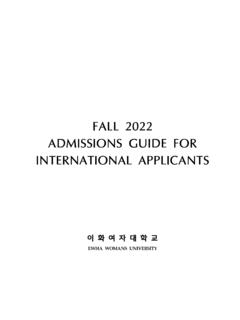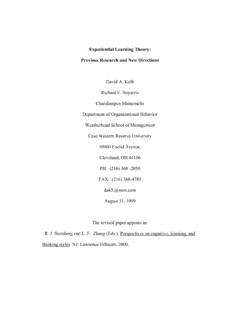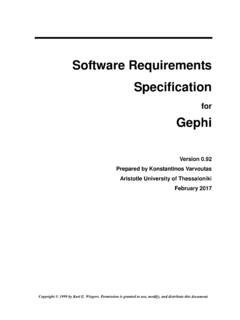Transcription of Writing Personal Statements for ... - Grinnell College
1 Writing Personal Statements for Scholarship Applications Advice for Grinnell College Students Doug Cutchins, Director of Social Commitment; x4940, Trying to define what constitutes an excellent Personal statement makes me feel like Supreme Court Justice Potter Stewart did in 1964, when he had to try and define pornography in Jacobellis v. Ohio. I shall not today attempt further to define the kinds of material I understand to be embraced within that shorthand description; and perhaps I could never succeed in intelligibly doing so, Stewart wrote. But I know it when I see Every Personal statement is different, and trying to define what constitutes an excellent Personal statement seems almost impossible. But I know it when I see it. While you can look at examples of top-notch Personal Statements , and this document tries to give you some guidance in crafting your own, in the end there is no model to follow.
2 This is both liberating and maddening. Liberating because it means you get to write what you want and how you want. Maddening because this lack of regulation and form requires you to create not just the topic, but the method of expression as well. In many ways, Writing a Personal statement is a 180-degree turn from what you re used to doing in College . You have been trained to write rather staid, formal, academic papers in which you know the format and what is expected of you, and the challenge lies in researching the topic at hand. In crafting a Personal statement you are the world s leading expert on the topic, but must create the method of conveying this information to the committee. What is a Personal statement? A Personal statement Your introduction to the committee. The heart of your application, which is your ticket to an interview, where the scholarship or fellowship will be decided.
3 A picture of you. An invitation to get to know you. An indication of your priorities. Your story. a serious examination of the intellectual and Personal experiences that have motivated you to participate in this process and to pursue the particular project you are proposing in your application, and the ways in which your intellectual and Personal experience since entering College have informed your choices. Among your best opportunities to gain solely from the process of applying for a scholarship or fellowship. Even if you aren t nominated or don t win, you will have this amazing document that crystallizes who you are and what s important to you in just a few hundred words. Taking the time to really work hard on this will pay dividends if not financial reward in the form of a scholarship, then as help as you look for other next steps after graduation.
4 In the end, every Personal statement I ve read that I thought was truly exceptional had one thing in common: when I finished reading it, I thought, I d like to meet this person. I d like to take this student out for a cup of coffee and learn more. A really effective Personal statement tells the reader what makes you different from everyone else in the applicant pool, and does so while utilizing engaging, interesting, and concise prose. With that very general advice in mind, here are more specific do s and don ts for Writing a Personal statement: DO Write from your gut. You re used to Writing from your head. Don t let your head make it up. Listen to your gut, and get it down. You can t tell them everything. Have a few main points you want to get across, and let them find out the rest of your story in your resume, interview, letters of recommendation, and other elements of your application.
5 When you decide on the main points and stories you want to tell, answer these questions: What is the point of the story you re telling? What do you need to include to tell it well? What isn t necessary? Have many others read it for objectivity and distance, since this is the most Personal topic you ll ever write about. Remember your high school English teacher s advice of show don t tell. Don t tell them that you re enthusiastic or passionate about a topic; tell them a story that shows your enthusiasm and passion. Include anecdotes of life-changing moments, or moments that clarified and crystallized what you want to do. Tailor your essay to the opportunity and application. What instructions do they give you for topics, length, etc? What parts of your story does the committee most want to hear about?
6 The first paragraph is vitally important. It sets tone and direction of the rest of the essay, and provides quick Personal insights. The conclusion should pull the essay together, but also point to the future and indicate how the themes developed throughout the essay will continue to develop. Give the committee a sense of how this opportunity will impact you in the long-term, and what the link is between your Personal statement and proposed program of study Sell yourself. Grinnell students have a wonderful sense of egalitarianism ( We re all talented. We re all smart. We re all wonderful. I m no different from my peers. ) that I love, but that can hurt you in a Personal statement, where you really need to set yourself apart from everyone else who is applying. Be careful, though, because there is a fine line here that you don t want to cross.
7 You have to write about yourself without being egotistical; be confident but not arrogant; be informative but also persuasive; and believe in yourself without seeming self-important. Think about, plan, and pay careful attention to your tone. How will your tone come across to your reader? What does it say about you? Tone can speak to who you are more loudly than do your words. Be authentic, accurate, and honest. Interview questions are usually based on your Personal statement more than any other element of your application, so don t write just what you think the committee will want to hear. Phoniness will come out in the interview and hurt you. In an interview, be prepared to delve much further into the topics and issues raised in your Personal statement. Give yourself lots of time to experiment and prepare many, many drafts, and perhaps even wholly different versions.
8 Your first few drafts are likely to be awful. That s ok. Don t be afraid to be terrible. The important thing is to get your ideas down on paper, then dress them up later. Think about how this fits in with the flow of your application how does it mesh with your letters of recommendation? Your transcript? Your proposal? Be human. Talk about your preferences, foibles, and obstacles. Explain and own your shortcomings. Write about what excites you, and don t be afraid to be sophisticated, detailed, and enthusiastic about it. This is especially true for scholarships that are strongly academic in nature, and that are being decided by academicians; they enjoy seeing young scholars excited about arcane or obscure ideas and research proposals. DON T Don t be flowery in your prose Don t refer to me/I too many times Don t use this as a resume in narrative form.
9 You should only talk about those accomplishments that are directly germane to the subject at hand. Let them find out about your other activities through the other elements of your application. You should try to avoid references to past traumas, such as deaths or alcohol and drug use in your family. While these may be important moments in your life, it is too easy to accidentally write about them in a way that seems schmaltzy, exploitative, or designed to create pity for you. Only write about traumatic events if they are crucial to understanding your topic to be studied or to your theme. If you are Writing about trauma, try to treat these moments with some distance and objectivity, and be sure to have others read your statement with this concern in mind. Remember that this is not a confessional. Don t be overly Personal or reveal details that could cause your reader to squirm.
10 This is not: o An academic paper with you as the subject. o A journal entry in which you reveal your most private thoughts and actions. o A plea or justification for the scholarship. Don t whine or beg. Getting Started Okay, that s all well and good. Now you have some very vague idea of what this is supposed to look like and some basic ground rules. But how do you get started? In general, remember that this is about listening to your gut, not letting your head talk. You have to find ways to turn off the logical, academic, editing part of your brain and tune in to your gut. Do this by engaging in mindless, repetitive activities that allow your mind to wander away, like doing dishes, jogging, or driving on a long, straight, uncrowded interstate. Or try Writing first thing in the morning, everyday, before your brain has a chance to really wake up and kick in.
